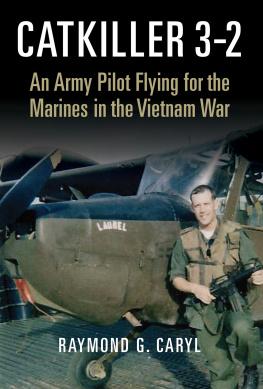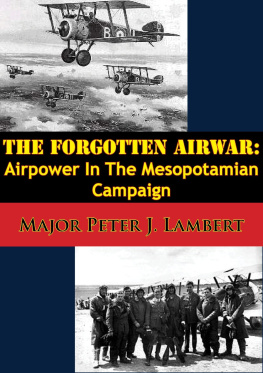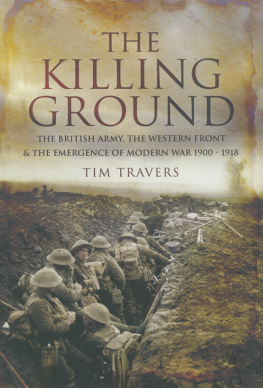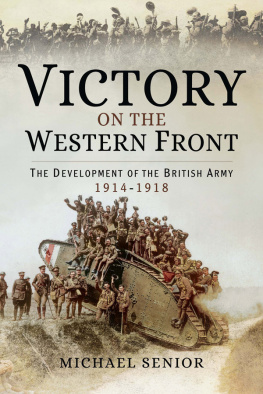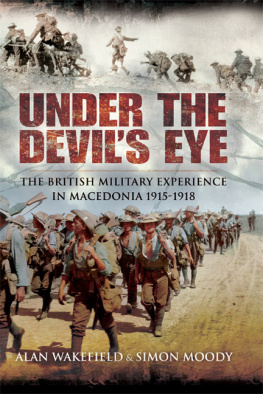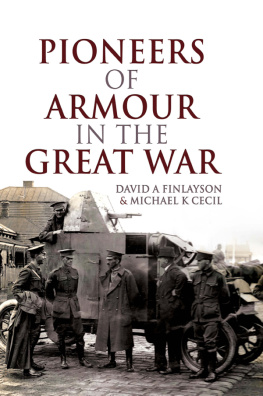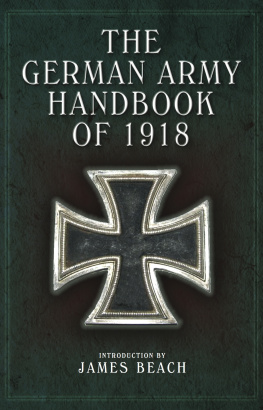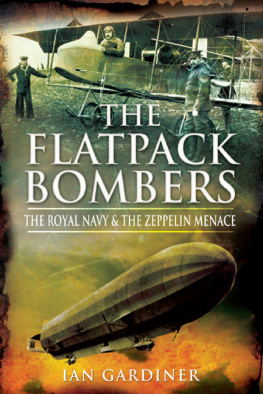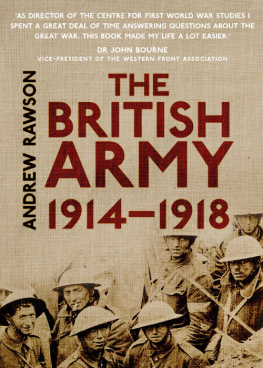The Royal Flying Corps, the Western Front and the Control of the Air, 19141918
By the middle of 1918 the British Army had successfully mastered the concept of all arms warfare on the Western Front. This doctrine, integrating infantry, artillery, armoured vehicles and crucially air power, was to prove highly effective and formed the basis of major military operations for the next hundred years. Yet, whilst much has been written on the utilisation of ground forces, the air element still tends to be studied in isolation from the army as a whole. In order to move beyond the usual aces and aircraft approach, this book explores the conceptual origins of the control of the air and the role of the Royal Flying Corps (RFC) within the British army. In so doing it addresses four key themes. First, it explores and defines the most fundamental air power concept the control of the air by examining its conceptual origins before and during the First World War. Second, it moves beyond the popular history of air power during the First World War to reveal the complexity of the topic. Third, it reintegrates the study of air power during the First World War, specifically that of the RFC, into the strategic, operational, organisational and intellectual contexts of the era, as well as embedding the study within the respective scholarly literatures of these contexts. Fourth, the book reinvigorates an entrenched historiography by challenging the usually critical interpretation of the RFCs approach to the control of the air, providing new perspectives on air power during the First World War. This includes an exploration of the creation of the RAF and its impact on the development of air power concepts.
James Pugh is a Lecturer in Modern History at the University of Birmingham, UK. His research explores Modern British History in the era of the two World Wars. This includes the history of air power during both conflicts, and he has published on air power leadership and doctrine. His latest research explores the history of amphetamines in Britain between 1935 and 1945, which includes articles in the Journal of Contemporary History and War in History.
Routledge Studies in First World War History
Edited by John Bourne
The University of Birmingham, UK
The First World War is a subject of perennial interest to historians and is often regarded as a watershed event, marking the end of the nineteenth century and the beginning of the modern industrial world. The sheer scale of the conflict and massive loss of life means that it is constantly being assessed and reassessed to examine its lasting military, political, sociological, industrial, cultural and economic impact. Reflecting the latest international scholarly research, the Ashgate Studies in First World War History series provides a unique platform for the publication of monographs on all aspects of the Great War. Whilst the main thrust of the series is on the military aspects of the conflict, other related areas (including cultural, visual, literary, political and social) are also addressed. Books published are aimed primarily at a post-graduate academic audience, furthering exciting recent interpretations of the war, whilst still being accessible enough to appeal to a wider audience of educated lay readers.
Also in this series
The Gallipoli Campaign
The Turkish Perspective
Edited by Metin Grcan and Robert Johnson
Arming the Western Front
War, Business and the State in Britain 19001920
Roger Lloyd-Jones and M.J. Lewis
Aerial Propaganda and the Wartime Occupation of France, 191418
Bernard Wilkin
The Great War and the British Empire
Culture and Society
Edited by Michael Walsh and Andrekos Varnava
The Royal Flying Corps, the Western Front and the Control of the Air, 19141918
James Pugh
First published 2017
by Routledge
2 Park Square, Milton Park, Abingdon, Oxon OX14 4RN
and by Routledge
711 Third Avenue, New York, NY 10017
Routledge is an imprint of the Taylor & Francis Group, an informa business
2017 James Pugh
The right of James Pugh to be identified as author of this work has been asserted by him in accordance with sections 77 and 78 of the Copyright, Designs and Patents Act 1988.
All rights reserved. No part of this book may be reprinted or reproduced or utilised in any form or by any electronic, mechanical, or other means, now known or hereafter invented, including photocopying and recording, or in any information storage or retrieval system, without permission in writing from the publishers.
Trademark notice: Product or corporate names may be trademarks or registered trademarks, and are used only for identification and explanation without intent to infringe.
British Library Cataloguing in Publication Data
A catalogue record for this book is available from the British Library
Library of Congress Cataloging in Publication Data
Names: Pugh, James, (British historian), author.
Title: The Royal Flying Corps, the Western Front and the control of the air,
19141918 / James Pugh.
Description: New York, NY : Routledge, 2017. |
Series: Routledge studies in First World War history | Includes bibliographical
references and index.
Identifiers: LCCN 2017000127| ISBN 9781472459725 (hardback : alk.
paper) | ISBN 9781315553191 (ebook)
Subjects: LCSH: Great Britain. Royal Flying Corps--History. | World War,
19141918--Aerial operations, British.
Classification: LCC D602 .P84 2017 | DDC 940.4/4941--dc23
LC record available at https://lccn.loc.gov/2017000127
ISBN: 978-1-4724-5972-5 (hbk)
ISBN: 978-1-315-55319-1 (ebk)
Typeset in Times New Roman
by HWA Text and Data Management, London
On 17 December 1903 Orville and Wilbur Wright made the first controlled and sustained flight of a heavier-than-air aircraft at Kitty Hawk, North Carolina, inaugurating the Age of Aviation. Progress was astonishing. In 1909 a French pilot, Louis Blriot, flew his plane across the English Channel, giving literally a new dimension to Edwardian fears of invasion. Military officers, far from dismissing powered flight for fear it would frighten the horses, were among the first to engage with the new technology. Colonel John Capper, Superintendent of the Royal Balloon Factory, met the Wright Brothers in October 1904 and was favourably impressed. The Aero Club, founded in 1901 to encourage ballooning, embraced the aeroplane in 1908 after demonstrations of powered flight by the Wright brothers in France. In the same year the Asquith government appointed an Advisory Committee for Aeronautics to investigate possible military and naval uses of aviation. In 1910 the Aero Club was granted a Royal title and began to issue aviators certificates. It issued thirty-nine certificates in 1910 and 130 in 1911. Military officers from both services and from different branches of the army were prominent among the early aviation pioneers. By the time the British army adopted aviation institutionally with the formation of the Royal Flying Corps (RFC) on 13 April 1912, many men who would be major figures in the history of British military aviation had already qualified as pilots, including Charles Samson (Certificate No. 71), Arthur Longmore (Certificate No. 72), Frederick Sykes (Certificate No. 95), Robert Brooke-Popham (Certificate No. 108), David Henderson (Certificate No. 118), Cyril Newall (Certificate No. 144), William Rhodes-Moorhouse (Certificate No. 147) and Robert Smith-Barry (Certificate No. 161). A Central Flying School was established at Upavon in Wiltshire on 12 May 1912 to provide pilots for the army and navy. In August 1914 the RFC was able to deploy four squadrons with the British Expeditionary Force, where they provided invaluable assistance, especially in reconnaissance. From these modest though impressive beginnings, Britains air arm grew exponentially during the war, evolving technologically, operationally, tactically and institutionally, eventually securing its independence as the Royal Air Force.


